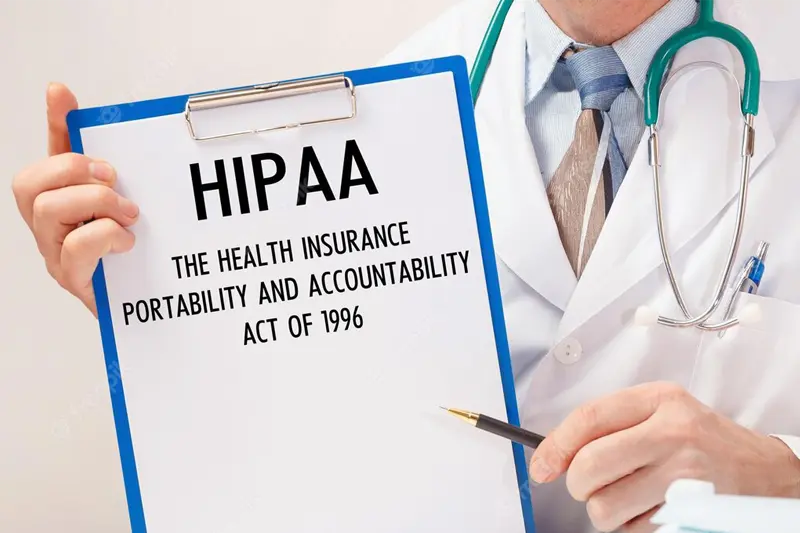
While the healthcare industry has increasingly transitioned to electronic health records (EHRs) and digital systems, many healthcare organizations still maintain a combination of paper and electronic records. Most healthcare providers partner with a medical transcription company to ensure that dictated physician reports are converted into accurate text documents needed for patients’ medical charts, billing, insurance claims, and decision making. Regardless of format, medical records must be stored securely in compliance with the applicable law and the standards prescribed by HIPAA and the Joint Commission. While HIPAA compliance is often associated with electronic health records and digital data security, it is equally applicable to paper records containing PHI.
What is Protected Health Information under HIPAA?
HIPAA’s Privacy Rule and Security Rule are the primary regulations that address the protection of patient information. The Privacy Rule establishes standards for the use and disclosure of protected health information (PHI), while the Security Rule outlines requirements for safeguarding electronic PHI (ePHI).
Under HIPAA, protected health information (PHI) is defined as individually identifiable information relating to the past, present, or future health status of an individual that is created, collected, or transmitted, or maintained by a HIPAA-covered entity in relation to the provision of healthcare, payment for healthcare services, or use in healthcare operations
(PHI healthcare business uses). Information that is considered PHI includes, but is not limited to:
- National identification numbers and demographic information such as name, birth dates, gender, ethnicity, and contact and emergency contact information
- Health information such as diagnoses, treatment information, medical test results, and prescription information
- Details about the type of care the patient received or how they paid for it
PHI is only considered PHI only when an individual can be identified from the information.
Paper Records and HIPAA Compliance
The medical record is confidential and should be protected from unauthorized disclosure by law. HIPAA was introduced before the widespread use of electronic health records (EHRs), and also applies to paper records containing protected health information (PHI). The Privacy Rule requires covered entities (such as healthcare providers, health plans, and healthcare clearinghouses) to implement reasonable safeguards to protect PHI, including information stored in paper form. Here are some key considerations for maintaining HIPAA compliance with paper records
Medical records and PHI must be stored and used so as to minimize incidental disclosure of PHI.HIPAA mandates that medical records must be appropriately secured against theft, fire and water damage, and erroneous destruction. Hard copy medical documents have similar standards for management as electronic records.
Here are 7 key considerations for maintaining HIPAA compliance with paper records:
- Physical security: HIPAA mandates physical safeguards to secure PHI stored in paper records. Healthcare providers, covered entities, and business associates must implement measures to prevent unauthorized access, theft, loss, or damage of paper records containing PHI. This may involve locked file cabinets, surveillance systems, restricted access to storage areas, and controlled entry to facilities housing these records.
- Administrative policies: Providers should develop and enforce policies and procedures related to the handling, storage, and disposal of paper records. This includes training staff on proper handling practices, establishing record retention periods, and implementing protocols for record destruction.
- Access controls: Only authorized personnel with a need to know should have access to paper records containing PHI. Controls such as unique user identification, role-based access, and monitoring mechanisms to track access to PHI should be implemented. Staff members should be trained on the importance of maintaining the confidentiality of patient information and the procedures for accessing and handling paper records securely.
- Data breach response: If there is a breach or unauthorized disclosure of PHI in paper records, HIPAA mandates that affected individuals, the U.S. Department of Health and Human Services (HHS), and, in some cases, the media, be notified. Healthcare entities should establish protocols for responding to and reporting data breaches involving paper records. Incident response plans are also required to address breaches promptly, mitigate harm, and comply with HIPAA’s breach notification requirements.
- Business Associate Agreements: If a healthcare provider works with third-party vendors or business associates such as medical transcription outsourcing companies that handle paper records, they should have HIPAA-compliant contracts (business associate agreements) in place to ensure that the business associates also maintain the security and privacy of PHI.
- Secure disposal of records: When paper records are no longer needed, they must be disposed of in a way that prevents unauthorized access. After they have been reviewed for a certain period of time, typically 30 to 60 days, and all the material has been properly scanned to obtain quality copies, those records can be destroyed, clarifies Raymond Rangel of Data Storage Centers (www.medicaleconomics.com). HIPAA regulations require proper disposal methods, such as shredding, to ensure that PHI remains confidential even after the records are no longer in use.
HIPAA requires avoiding incidental disclosure of PHI during disposal. Experts recommend professional shredding services, as this would ensure issue of a certificate of destruction. - Retention policies: Covered entities should have policies outlining how long paper records containing PHI should be retained and when they can be securely destroyed. These policies help prevent the unnecessary storage of records that are no longer needed. Each state has different requirements. Retention schedules also differ based on type of medical service or patient. For e.g., pediatric records have to be retained for a much longer period than typical adult healthcare records. For instance, though the period for which paper records have to be retained in Arizona is six years, pediatric records are required to be stored for a minimum of 10 years, and often, until the patient turns 18. Retention policies should be applied consistently so that records are not destroyed prematurely.
Additional safeguards for physical HIPAA documents:
- Medical files, folders or records should be secured at all times. When moving or handling medical records and PHI in volume, medical records and PHI should be covered in a way that no personal identifiers are visible.
- As it is privileged information, care must be taken not to discuss the medical record in an open setting.
- Individual documents should not be separated from the medical record and PHI. If pages are removed to make copies, they should be arranged according to the specific record type. This important to know what that document is and how to acquire it or secure it.
Ultimately, achieving and maintaining HIPAA compliance with paper records requires a comprehensive approach that incorporates physical security, administrative policies, access controls, and secure disposal practices. Organizations should regularly assess their compliance efforts, conduct risk assessments, and stay informed about any updates or changes to HIPAA regulations to ensure ongoing adherence to the requirements.
Organizations that fail to comply with HIPAA requirements are subject to fines and, in serious cases, imprisonment. To cite a 2023 article in HIPAA Journal: “The penalties for non-compliance with HIPAA regulations include civil monetary penalties ranging from $100 to $50,000 per violation, depending on the level of culpability. Criminal penalties can also be imposed for intentional violations, leading to fines and potential imprisonment
Utilizing electronic medical records (EHRs) empowers physicians to oversee and enhance the quality of care provided within their practice or organization. With electronic records, organizations gain heightened security control, enabling precise management of patient information access and timing. Outsourcing transcription to a HIPAA-compliant medical transcription company guarantees utmost patient data privacy through robust encryption techniques and rigorous security protocols.


